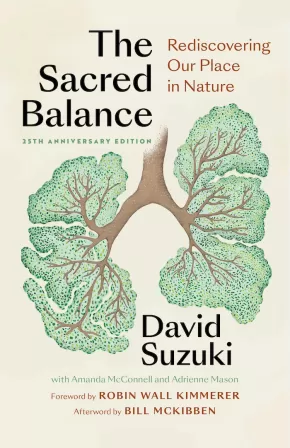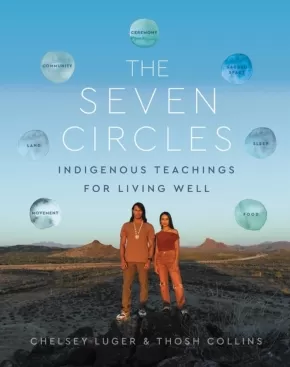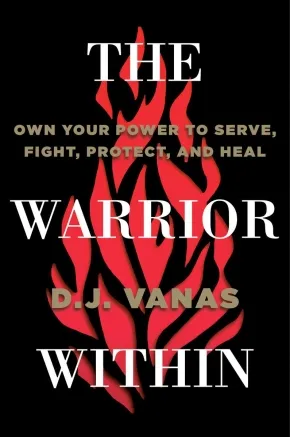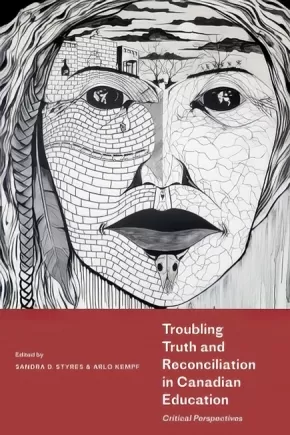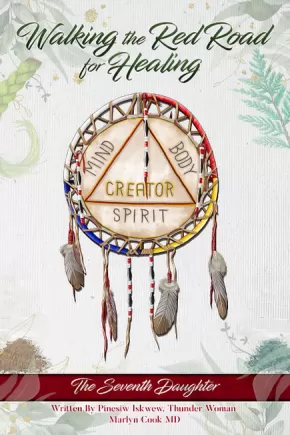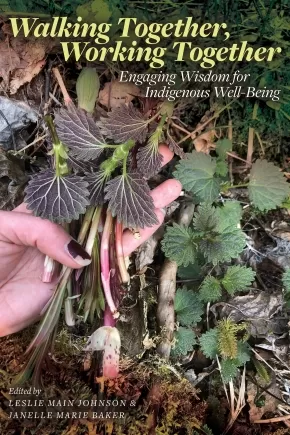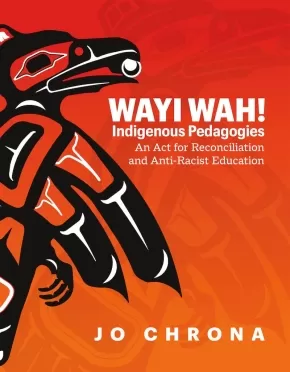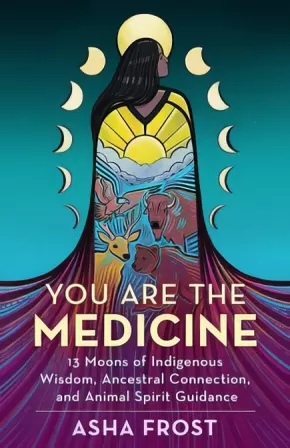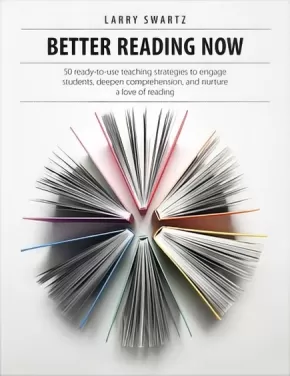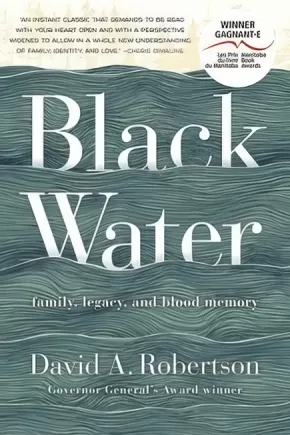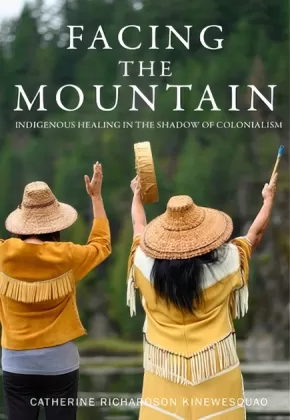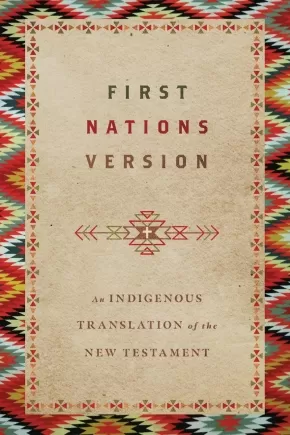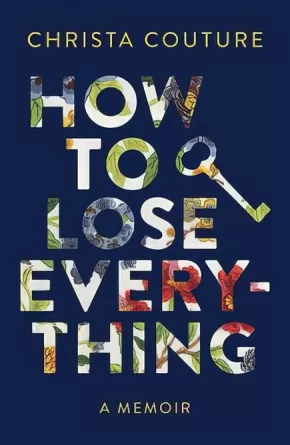
Healing and Wellness
106
-
120
of
303 Results;
Sort By
Go To
of 21
The Sacred Balance: Rediscovering Our Place in Nature - 25th Anniversary Edition
$26.95
Format:
Paperback
Text Content Territories:
Indigenous;
Reading Level: N/A
ISBN / Barcode: 9781771649865
Synopsis:
Synopsis:
“The Sacred Balance has a beautiful spirit.”—E.O. Wilson
With a new foreword from Robin Wall Kimmerer, New York Times-bestselling author of Braiding Sweetgrass—and an afterword from Bill McKibben—this special 25thanniversary edition of a beloved bestseller invites readers to see ourselves as part of nature, not separate.
The world is changing at a relentless pace. How can we slow down and act from a place of respect for all living things? The Sacred Balance shows us how.
In this extensively updated new edition, David Suzuki reflects on the increasingly radical changes in science and nature—from the climate crisis to peak oil and the rise in clean energy—and examines what they mean for humankind. He also reflects on what we have learned by listening to Indigenous leaders, whose knowledge of the natural world is profound, and whose peoples are on the frontlines of protecting land and water around the world.
Drawing on his own experiences and those of others who have put their beliefs into action, The Sacred Balance combines science, philosophy, spirituality, and Indigenous knowledge to offer concrete suggestions for creating an ecologically sustainable future by rediscovering and addressing humanity’s basic needs.
Additional Information
336 pages | 8.50" x 5.50" | Paperback
The Seven Circles: Indigenous Teachings for Living Well
$36.99
Format:
Hardcover
Text Content Territories:
Indigenous American; Native American; Sioux; Pima (Akimel O'odham); Osage; Haudenosaunee (Iroquois); Seneca; Cayuga; Anishinaabeg; Ojibwe (Chippewa); Turtle Mountain Anishinaabe;
Grade Levels: 12; University/College;
ISBN / Barcode: 9780063119208
Synopsis:
Synopsis:
In this revolutionary self-help guide, two beloved Native American wellness activists offer wisdom for achieving spiritual, physical, and emotional wellbeing rooted in Indigenous ancestral knowledge.
When wellness teachers and husband-wife duo Chelsey Luger and Thosh Collins founded their Indigenous wellness initiative, Well for Culture, they extended an invitation to all to honor their whole self through Native wellness philosophies and practices. In reclaiming this ancient wisdom for health and wellbeing—drawing from traditions spanning multiple tribes—they developed the Seven Circles, a holistic model for modern living rooted in timeless teachings from their ancestors. Luger and Collins have introduced this universally adaptable template for living well to Ivy league universities and corporations like Nike, Adidas, and Google, and now make it available to everyone in this wise guide.
The Seven Circles model comprises interconnected circles that keep all aspects of our lives in balance, functioning in harmony with one another. They are:
- Food
- Movement
- Sleep
- Ceremony
- Sacred Space
- Land
- Community
In The Seven Circles, Luger and Collins share intimate stories from their life journeys growing up in tribal communities, from the Indigenous tradition of staying active and spiritually centered through running and dance, to the universal Indigenous emphasis on a light-filled, minimalist home to create sacred space. Along the way, Luger and Collins invite readers to both adapt these teachings to their lives as well as do so without appropriating and erasing the original context, representing a critical new ethos for the wellness space. Each chapter closes with practical advice on how to engage with the teachings, as well as wisdom for keeping that particular circle in harmony with the others.
With warmth and generosity—and 75 atmospheric photographs by Collins throughout—The Seven Circles teaches us how to connect with nature, with our community, and with ourselves, and to integrate ancient Indigenous philosophies of health and wellbeing into our own lives to find healing and balance.
Reviews
“A life-changing holistic guide to wellness rooted in empowerment, resiliency, and ‘good medicine.’ This book is for any human being searching for wellness solutions in a chaotic world, a true antidote to colonization.” — Vina Brown, Indigenous Scholar, Entrepreneur, Artist, and Professor of Indigenous Studies at Northwest Indian College
“The Seven Circles is a true innovation in Indigenous thought; it brings our shared heritage and traditional teachings to life. Truly inspiring. Readers will find their journey to be a motivating guide for self-transformation.” — Taiaiake Alfred, Mohawk Philosopher
“While the term ‘wellness’ has been co-opted and diluted by (primarily white) social media influencers in recent years, Luger and Collins are recentering the conversation around how to use Indigenous cultural values, foods, and modalities of movement as tools for spiritual, mental, physical, and emotional healing.” — Vanity Fair
“[Two of the] faces in the health and wellness scene that are pushing for inclusivity, justice, and kindness, toppling old conventions to make their own…Luger and Collins rewrite modern narratives regarding Native health while addressing complex histories and ongoing disparities.” — Outside magazine
“Spellbinding. This may be the first book I’ve ever read that made me stop and decide, “I’m making this change now!” Seven Circles opened my eyes to a way of life that is tested by time, guided by nature, and urgently needed today." — Christopher McDougall, author of Born to Run, Natural Born Heroes, and Running with Sherman
“Wisdom abounds in this stimulating offering.” — Publishers Weekly
“Luger and Collins provide a range of sensible, informed, accessible guidance for both small- and large-scale lifestyle changes. An appealing manual for healing the self through Indigenous traditions.” — Kirkus Reviews
Additional Information
256 pages | 7.00" x 9.00" | 75 Colour Photos | Hardcover
The Warrior Within: Own Your Power to Serve, Fight, Protect, and Heal
$39.00
Format:
Hardcover
Text Content Territories:
Indigenous American; Native American;
Reading Level: N/A
ISBN / Barcode: 9780593423011
Synopsis:
Synopsis:
A transformational guide to getting yourself right in order to accomplish the work you were meant to do, from speaker, former U.S. Air Force officer, and member of the Ottawa tribe D.J. Vanas.
When faced with an important job, and people depending on you to do it, most of us will give and give until there’s nothing left. But running on empty, even for a worthy cause, only sets you up for failure in the long run. To persevere on the path to success requires more than sheer fearlessness and willpower. It requires what D.J. Vanas calls the warrior spirit, the kind of strength that looks outward but comes from deep within.
Drawing inspiration from Native American philosophy and tradition, The Warrior Within outlines a new model for personal power in the face of overwhelming chaos. A true warrior is not the toughest or bravest person in the room. A true warrior is committed to self-mastery, knows how to navigate change and disruption, transforms setbacks into opportunities for achievement, refuses to quit, and most importantly, always fights for something bigger than the self. With a vast array of stories and examples, from vision quests to treacherous hikes to veterans and service providers at the front lines, Vanas shows how to apply these principles to transform how you show up both for yourself and those around you.
More than an empowerment manual, The Warrior Within is a call to accomplish the world-changing work you were meant for by tapping into the power of the warrior spirit.
Reviews
"The powerful lessons imparted in these chapters will inspire strength, confidence and motivation, so that you can deliver your best in the worst of circumstances—while keeping your sanity and health! I encourage every healthcare giver to read The Warrior Within, for they truly serve, fight, protect and heal every day, often at their own expense."--LeAnn Thieman, author of the Chicken Soup for Nurse’s Soul series and founder of SelfCare for HealthCare®
"I highly recommend The Warrior Within! Through great storytelling, D.J. Vanas shares an often overlooked element of leadership ... taking care of yourself. Our beautiful Anishinaabe teachings emphasize balance in all things. Being a warrior means recognizing your needs and honoring your gifts. Way to go, D.J.!"--Angeline Boulley (Sault Ste. Marie Tribe of Chippewa Indians) New York Times bestselling author of Firekeeper's Daughter
"D.J. Vanas inspires us to find our ‘warrior spirit’ of courage, perseverance, resilience, and teamwork in life’s most fearful times. Your heart will soar like an eagle as you read how ordinary heroes use this inner strength to serve others—and how we can learn to do the same.”--Joseph Pfeifer, FDNY Assistant Chief, retired, author of Ordinary Heroes
“This is it: the book I’ve been waiting for! There isn’t another on the market that applies indigenous principles and ideas in order to expose the warrior in you. A comprehensive, compelling, emotional and amazingly insightful book. I couldn’t put it down. I wish I had this book years ago!"--Juanita Mullen (Seneca), AI/AN Veterans Liaison, Department of Veterans Affairs
“DJ Vanas describes a life of leading and doing through Indigenous identity and values. Combining his personal story with advice, The Warrior Within is more than a leadership book. It is a story of living a life of abundance and rich relationships, with DJ as your terrific guide.”-Cheryl Crazy Bull, President & CEO, American Indian College Fund
Additional Information
256 pages | 5.72" x 8.57" | Hardcover
Troubling Truth and Reconciliation in Canadian Education: Critical Perspectives (Styres-Kempf-Hare)
$46.99
Format:
Paperback
Text Content Territories:
Indigenous Canadian;
ISBN / Barcode: 9781772126006
Synopsis:
Synopsis:
Troubling Truth and Reconciliation in Canadian Education offers a series of critical perspectives concerning reconciliation and reconciliatory efforts between Canadian and Indigenous peoples. Indigenous and non-Indigenous scholars address both theoretical and practical aspects of troubling reconciliation in education across various contexts with significant diversity of thought, approach, and socio-political location. Throughout, the work challenges mainstream reconciliation discourses. This timely, unflinching analysis will be invaluable to scholars and students of Indigenous studies, sociology, and education.
Contributors: Daniela Bascuñán, Jennifer Brant, Liza Brechbill, Shawna Carroll, Frank Deer, George J. Sefa Dei (Nana Adusei Sefa Tweneboah), Lucy El-Sherif, Rachel yacaaʔał George, Celia Haig-Brown, Arlo Kempf, Jeannie Kerr, Ruth Green, David Newhouse, Amy Parent, Michelle Pidgeon, Robin Quantick, Jean-Paul Restoule, Toby Rollo, Mark Sinke, Sandra D. Styres, Lynne Wiltse, Dawn Zinga
Reviews
"This is crucially important work at this time, as universities, provincial education boards, and school districts grapple with their responses to the TRC. The contributors to Troubling Truth and Reconciliation in Canadian Education continue dialogues around reconciliation, decolonization, and Indigenization in schools at every level across Canada and offer real and actionable insights for educational leaders and teachers." - Shannon C. Leddy, University of British Columbia
"Troubling Truth and Reconciliation in Canadian Education is a significant contribution in this era of the post-TRC, the Calls to Action, the MMIWG inquiry report, and the ongoing difficulties and legacies of systemic racism/colonialism against Indigenous peoples in Canadian institutions." - Lisa Korteweg, Lakehead University
Educator Information
Table of Contents
vii Foreword
JAN HARE
xiii Acknowledgements
xv A Troubling Place to Start: Reconciliation in Collapse
ARLO KEMPF, SANDRA D. STYRES, LIZA BRECHBILL AND LUCY EL-SHERIF
I
Theoretical Perspectives on (Ir)reconciliation: Polishing the Silver Covenant Chain
1 | Discovering Truth in the Post-TRC Era: Morality and Spirituality Discourses in the Reconciliatory Journeys of Schools
FRANK DEER
2 | Indigenous Resiliency, Renewal, and Resurgence in Decolonizing Canadian Higher Education
MICHELLE PIDGEON
3 | Uncomfortable Realities: Reconciliation in Higher Education
DAWN ZINGA
4 | Contested Knowledges: Indigeneity, Resistance, and Black Theorizing in Academia
GEORGE J. SEFA DEI (NANA ADUSEI SEFA TWENEBOAH)
5 | Some of Us Are More Canadian Than Others: Pedagogies of Citizenship and Learning Racialized Settlerhood
LUCY EL-SHERIF AND MARK SINKE
6 | The Performativity of Reconciliation: Illusory Justice and the Site C Dam
RACHEL YACAAʔAŁ GEORGE
7 | Beyond Curricula: Colonial Pedagogies in Public Schooling
TOBY ROLLO
II
Reconceptualizing Reconciliation in Education: Teaching and Learning in Right Relation
8 | Reconciliation and Relational Ethics in Education
SANDRA D. STYRES AND ARLO KEMPF
9 | Exploring Tensions in Taking Up the Call for Reconciliation in Teacher Education
LYNNE WILTSE
10 | Troubling Trespass: Moving Settler Teachers Toward Decolonization
DANIELA BASCUÑÁN, MARK SINKE, SHAWNA M. CARROLL, AND JEAN-PAUL RESTOULE
11 | Talking It Through, Talking Through It: A Dialogue on Indigenizing Education
CELIA HAIG-BROWN AND RUTH GREEN
12 | Recalling the Spirit and Intent of Indigenous Literatures
JENNIFER BRANT
13 | Teaching Indigenous Studies in a Time of Reconciliation: An Anticolonial Approach Toward Postcolonial Awareness
DAVID NEWHOUSE AND ROBIN QUANTICK
14 | Contemporary Colonialism and Reconciliation in Higher Education: A Decolonial Response Through Relationality
JEANNIE KERR AND AMY PARENT
Contributors
Additional Information
328 pages | 6.00" x 9.00" | Paperback
Walking the Red Road for Healing: The Seventh Daughter
$29.99
Format:
Paperback
Text Content Territories:
Indigenous Canadian; First Nations; Cree (Nehiyawak); Swampy Cree ; Misipawistik Cree Nation;
Grade Levels: 12; University/College;
ISBN / Barcode: 9781990297243
Synopsis:
Synopsis:
Pinesiw Iskwew, Thunder Woman, Dr. Marlyn Cook, member of Misipawistik Cree Nation is the author of Walking the Red Road for Healing. This book is based on her life and journey as a Cree Woman, Pipe Carrier, Sundancer, Sweat Lodge Keeper, and medical doctor (graduate MD 1987). She believes the approach for healing must be holistic and that our Traditional Healers work alongside physicians in our Indigenous communities. Dr. Marlyn Cook shares her own experiences of colonialism and how this affected her, her family and her community. Through her reflections of her Indigenous Knowledge, her Traditional Teachings of Ceremonies and Medicines, she acknowledges the resilience of communities in their healing and provides ways to heal. Dr. Cook’s intention in this powerful book is to bring us together in Truth and Reconciliation. This book will resonate with health, social, and justice prac
Educator Information
Keywords / Themes: Adult Education, Health & Healing, Traditional Teachings, Indigenous Knowledge, Truth and Reconciliation.
Additional Information
Pages: 200 | Paperback
Walking Together, Working Together: Engaging Wisdom for Indigenous Well-Being
$34.99
Editors:
Format:
Paperback
Text Content Territories:
Indigenous Canadian;
ISBN / Barcode: 9781772125375
Synopsis:
Synopsis:
This collection takes a holistic view of well-being, seeking complementarities between Indigenous approaches to healing and Western biomedicine. Topics include traditional healers and approaches to treatment of disease and illness; traditional knowledge and intellectual property around medicinal plant knowledge; the role of diet and traditional foods in health promotion; culturally sensitive approaches to healing work with urban Indigenous populations; and integrating biomedicine, alternative therapies, and Indigenous healing in clinical practice. Throughout, the voices of Elders, healers, physicians, and scholars are in dialogue to promote Indigenous community well-being through collaboration. This book will be of interest to scholars in Indigenous Studies, medicine and public health, medical anthropology, and anyone involved with care delivery and public health in Indigenous communities.
Contributors: Darlene Auger, Dorothy Badry, Margaret David, Meda DeWitt, Hal Eagletail, Gary L. Ferguson III, Marc Fonda, Annie Goose, Angela Grier (Pioohksoopanskii), Leslie Main Johnson, Allison Kelliher, Patrick Lightning, Mary Maje, Maria Mayan, Ruby E. Morgan, Richard T. Oster, Ann Maje Raider, Camille (Pablo) Russell, Ginetta Salvalaggio, Ellen L. Toth, Harry Watchmaker
Additional Information
272 pages | 6.00" x 9.00" | Paperback
Walking Together: The Future of Indigenous Child Welfare on the Prairies
$39.95
Format:
Paperback
Text Content Territories:
Indigenous Canadian;
Grade Levels: University/College;
ISBN / Barcode: 9780889778900
Synopsis:
Synopsis:
Indigenous and non-Indigenous scholars forward child welfare issues currently impacting Indigenous children in Canada.
Developed by the Prairie Child Welfare Consortium, this edited collection brings together accomplished Indigenous and non-Indigenous scholars from the prairie provinces to forward critical research about a range of contemporary child welfare issues currently impacting Indigenous children in Canada.
Centering Indigenous knowledge and working to decolonize child welfare, contributors address the over-representation of Indigenous children in the child welfare system, the un-met recommendations of the TRC, the connections between colonialism and fetal alcohol spectrum disorders, the impact of Bill C-92, and more.
Contributors include: Jason Albert, Dorothy Badry, Cindy Blackstock, Elder Mae Louise Campbell, Peter Choate, Linda Dano-Chartrand, Michael Doyle, Koren Lightning Earle, Arlene Eaton Erickson, Yahya El-Lahib, Hadley Friedland, Don Fuchs, Del Graff, Jennifer Hedges, Bernadette Iahtail, Jennifer King, Brittany Mathews, Eveline Milliken, Kelly Provost—Ekkinnasoyii (Sparks in a Fire), Christina Tortorelli, Gabrielle Lindstrom Tsapinaki, Susannah Walker, and Robyn Williams
Reviews
“A great contribution for all of us who conduct research, teach, and work directly in the field of Indigenous child welfare practice.”—Jeannine Carrière, author of Calling Our Families Home: Métis Peoples’ Experiences with Child Welfare
Additional Information
288 pages | 5.00" x 7.50" | Paperback
Wayi Wah! Indigenous Pedagogies: An Act for Reconciliation and Anti-Racist Education
$35.99
Format:
Paperback
Text Content Territories:
Indigenous Canadian;
Reading Level: N/A
ISBN / Barcode: 9781774920466
Synopsis:
Synopsis:
Extend your learning to explore how racism and bias are embedded in education systems, as well as our own perspectives—and how to create equitable education for all learners.
How can Indigenous knowledge systems inform our teaching practices and enhance education? How do we create an education system that embodies an anti-racist approach and equity for all learners?
This powerful and engaging resource is for non-Indigenous educators who want to learn more, are new to these conversations, or want to deepen their learning.
Some educators may come to this work with some trepidation. You may feel that you are not equipped to engage in Indigenous education, reconciliation, or anti-racism work. You may be anxious about perpetuating misconceptions or stereotypes, making mistakes, or giving offence. In these chapters, I invite you to take a walk and have a conversation with a good mind and a good heart.
With over two decades in Indigenous education, author Jo Chrona encourages readers to acknowledge and challenge assumptions, reflect on their own experiences, and envision a more equitable education system for all. Each chapter includes:
- reflection questions to help process the ideas in each chapter
suggestions for taking action in both personal and professional spheres of influence - recommended resources to read, watch, or listen to for further learning
- personal reflections and anecdotes from the author on her own learning journey
- voices of non-Indigenous educators who share their learning and model how to move into, and sit, in places of unknowing and discomfort, so we can examine our own biases and engage in this work in a good way
Grounded in the First Peoples Principles of Learning, this comprehensive guide builds on Chrona’s own experiences in British Columbia’s education system to explore how to shape anti-racist and equitable education systems for all.
Perfect for reading on your own or with your professional learning community!
Educator Information
Table of Contents
1 Where Do We Begin? Setting Up Our Space in A Good Way
- Situating Ourselves
- An Invitation
- Some Structural Guidance as You Read
- Discomfort: Moving Through the Fear of Making Mistakes
- Taking Responsibility
2 Indigenous Education Is Not Multicultural Education
- Defining Indigenous Education
- Culturally Responsive Education and Beyond
3 Yes, You Have a Role: Reconciliation Through Education
- Our Collective Responsibility
- This Is Not “Just History”; This Is Now
- Colonization Past and Present
- Reconciliation Through Education
- A Vision of a System
4 So, Let’s Talk About the R Word
- Begin With Honesty
- Becoming Anti-Racist in Canada
- Investigating Our Own Biases and Assumptions
- How We Define Racism Matters
- Relational Racism
- Systemic Racism
- Learning and Growing
5 An Indigenous-Informed Pedagogy: The First Peoples Principles of Learning
- Moving From “Learning About” to “Learning From”
- How Were the FPPL Identified?
- What Is Important to Know About the FPPL?
- A Closer Look at Each Principle
- Current Contexts
6 Authentic Indigenous Resources
- Voice and Representation
- Authentic Resource Evaluation Criteria
- Collaborative Development of Local First Nations, Inuit, and Métis Resources
7 A Story of One System: Indigenous Education in British Columbia
- On a Learning Journey
- The Power of Indigenous Advocacy and United Voice
- Government Commitments and Obligations
- Bumpy Paths
8 Now What?
- Next Steps
- Final Thoughts: Working in Relation
References
Additional Information
232 pages | 7.00" x 9.00" | Paperback
You Are the Medicine: 13 Moons of Indigenous Wisdom, Ancestral Connection, and Animal Spirit Guidance
$23.99
Format:
Paperback
Text Content Territories:
Indigenous Canadian; First Nations; Anishinaabeg; Ojibway;
Reading Level: N/A
ISBN / Barcode: 9781401963507
Synopsis:
Synopsis:
Indigenous Medicine Woman Asha Frost invites readers to learn the healing medicine of the 13 Ojibway moons and the spirit animals that will guide their wisdom journey.
If you are drawn to Indigenous Medicine ways, you, too, have power and beauty in your own lineage waiting to be discovered.
Follow the path of the 13 Ojibway moons with animal spirits as your guides to unlock powerful teachings that will help you directly experience your own medicine connection to your inherent healing powers. If you feel you don't have access to your roots, ancestors, or spiritual connection and you look outside of yourself for answers, you are forgetting the medicine you need lives within you.
Through storytelling, personal reflections, ceremonies, rituals, and shamanic journeys, readers will learn to apply ancient wisdom and ancestral medicine to their own lives in meaningful ways that are respectful and conscious of the stolen lands, lives, and traditions of Indigenous peoples.
Discover how to:
• Ground and root into your own lineage and your ancestral guides.
• Connect to spirit and your innate healing powers in your own unique way.
• Practice self-care and rest on your journey.
• Return ancestral ways of cleansing and purifying.
• Trust and surrender in order to manifest.
• Remember your dreams and use them in your daily life.
• Release self-doubt, fear, disconnection, and insecurity.
Additional Information
280 pages | 5.50" x 8.50" | Paperback
Better Reading Now: 50 Ready-to-Use Teaching Strategies to Engage Students, Deepen Comprehension, and Nurture a Love of Reading
$28.95
Format:
Paperback
ISBN / Barcode: 9781551383491
Synopsis:
Synopsis:
Based on what we now know about reading, this practical book offers strategies in a consistent format that is easy for teachers to incorporate into their daily instruction. This grab-bag of classroom-tested activities allows teachers to choose what they need to meet the diverse needs of students from first to eighth grade. These strategies guide students through the reading process and build important comprehension skills through reading, talk, art, drama and more. These innovative ways to use the best children’s books inspire students to become enthusiastic and avid readers and to take the first giant step into becoming lifelong readers.
Educator Information
A grab-bag of ready-to-use strategies that promote a love of reading.
Shows how to use the best children's books in classrooms in new and innovative ways.
Illustrates how to balance great books that matter with screen time.
Additional Information
160 pages | 8.38" x 10.88"
Black Water: Family, Legacy, and Blood Memory (PB)
$21.00
Format:
Paperback
Text Content Territories:
Indigenous Canadian; First Nations; Cree (Nehiyawak); Swampy Cree ; Norway House Cree Nation;
Reading Level: n/a
ISBN / Barcode: 9781443457781
Synopsis:
Synopsis:
A son who grew up away from his Indigenous culture takes his Cree father on a trip to their family's trapline, and finds that revisiting the past not only heals old wounds but creates a new future.
The son of a Cree father and a non-Indigenous mother, David A. Robertson was raised with virtually no knowledge or understanding of his family’s Indigenous roots. His father, Don, spent his early childhood on a trapline in the bush northeast of Norway House, Manitoba, where his first teach was the land. When his family was moved permanently to a nearby reserve, Don was not permitted to speak Cree at school unless in secret with his friends and lost the knowledge he had been gifted while living on his trapline. His mother, Beverly, grew up in a small Manitoba town with not a single Indigenous family in it. Then Don arrived, the new United Church minister, and they fell in love.
Structured around a father-son journey to the northern trapline where Robertson and his father will reclaim their connection to the land, Black Water is the story of another journey: a young man seeking to understand his father's story, to come to terms with his lifelong experience with anxiety, and to finally piece together his own blood memory, the parts of his identity that are woven into the fabric of his DNA.
Reviews
“An instant classic that demands to be read with your heart open and with a perspective widened to allow in a whole new understanding of family, identity, and love.” — Cherie Dimaline
“When someone lives their life in a good way, the Haisla call them handsome people. David A. Robertson’s biography is the perfect example of someone who takes care with his words and speaks respectfully; he tackles identity and racism, family bonds and breaks, with nuance and honesty. The power of this approach makes Black Water an essential and timely book.” — Eden Robinson, bestselling author of The Trickster Trilogy
Additional Information
288 pages | 5.31" x 8.00" | Paperback
Decolonizing Wealth: Indigenous Wisdom to Heal Divides and Restore Balance - 2nd Edition
$28.95
Format:
Paperback
Text Content Territories:
Indigenous American; Native American;
Grade Levels: University/College;
ISBN / Barcode: 9781523091416
Synopsis:
Synopsis:
This second edition expands the provocative analysis of the racist colonial dynamics at play in philanthropy and finance into other sectors and offers practical advice on how anyone can be a healer.
The world is out of balance. With increasing frequency, we are presented with the inescapable truth that systemic racism and colonial structures are foundational principles to our economies. The $1 trillion philanthropic industry is one example of a system that mirrors oppressive colonial behavior. It’s an industry whose name means “the love for humankind,” yet it does more harm than good.
In Decolonizing Wealth, Edgar Villanueva looks past philanthropy’s glamorous, altruistic façade and into its shadows: white supremacy, savior complexes, and internalized oppression. Across history and to the present day, the accumulation of wealth is steeped in trauma. How can we shift philanthropy toward social reconciliation and healing if the cornerstones are exploitation, extraction, and control?
Drawing from Native traditions, Villanueva empowers individuals and institutions to begin to repair the damage through his Seven Steps to Healing. In this second edition, Villanueva adds inspiring examples of people using their resources to decolonize entertainment, museums, libraries, land ownership, and much more.
Everyone can be a healer and a leader in restoring balance—and we need everyone to do their part. As Villanueva writes, “All our suffering is mutual. All our healing is mutual. All our thriving is mutual.” Are you ready?
Reviews
“Edgar outlines with compassion and clarity thoughtful and practical steps toward aligning our money with our values. There are important lessons here for anyone working in finance or philanthropy.” —Keith Mestrich, President and CEO, Amalgamated Bank
“Decolonizing Wealth is a must-read for philanthropists and donors looking to achieve the change we want to see in the world. Compelling, honest, and kind, Edgar is clear that we must free funding resources and the philanthropic sector itself from frameworks that further exacerbate the problems rather than bring us closer to identifying and activating the solutions.”—Alicia Garza, co-creator of Black Lives Matter Global Network, and Principal, Black Futures Lab
“Edgar has broken through the tired jargon of philanthropy-speak and written a fresh, honest, painful, and hopeful book, grounded in his own truths and Native traditions. He offers some radical thinking about what it would take to bring about a world where power and accountability shifted and communities controlled the resources vital to their strength and futures.”—Gara LaMarche, President, Democracy Alliance; former President, Atlantic Philanthropies; and former Vice President and Director of US Programs, Open Society Foundations
“Due to years of detrimental federal Indian policy and discriminatory economic systems, Native American communities have been marginalized and left out of the economic opportunity experienced by other Americans. Edgar offers a new vision and an Indigenous perspective that can put us on a better path. Everyone should read Decolonizing Wealth, especially those who control the flow of resources in government, philanthropy, and finance.”—LaDonna Harris (Comanche), politician, activist, and founder of Americans for Indian Opportunity
“Decolonizing Wealth offers a refreshing and inspired look at how wealth can better serve the needs of communities of color and atone for the ways in which it has traditionally been used to inflict harm and division. Using a solutions-oriented framing, Edgar makes a solid case for how Indigenous wisdom can be used as a guiding light to achieve greater equity in the funding and philanthropic world.”—Kevin Jennings, President, Tenement Museum
“Finally, a Native perspective on how to heal internal systemic challenges. Decolonizing Wealth not only is an unflinching examination of today’s philanthropic institutions and the foundations upon which they were built but also offers critical wisdom applicable to many sectors.” —Sarah Eagle Heart (Lakota), CEO, Native Americans in Philanthropy
“We should all be grateful to Edgar Villanueva for helping us understand, by sharing Indigenous wisdom, that there is a path toward a more transformative approach to wealth, to investment, and to giving. We cannot truly call ourselves ethical, progressive, or mission-aligned investors until we have wrestled honestly with the fundamental issues raised in this book.”—Andrea Armeni, co-founder and Executive Director, Transform Finance
Additional Information
240 pages | 5.56" x 8.50" | Paperback
Facing the Mountain: Indigenous Healing in the Shadow of Colonialism
$33.00
Format:
Paperback
Text Content Territories:
Indigenous Canadian; First Nations; Cree (Nehiyawak); Dene; Dinjii Zhuh (Gwich'in); Métis;
Reading Level: N/A
ISBN / Barcode: 9781926476582
Synopsis:
Synopsis:
Nowhere in the texts on counselling, recovery, or lifespan development does it make links between well-being and not having your land stolen. When an entire people are generally portrayed as mentally ill, because that is, of course, what it means to have a diagnosis of clinical depression, anxiety, or post-traumatic stress disorder, it is easy for the State to view these people as unfit to manage their lives. Then, all sorts of functions are performed on Indigenous families that are tantamount to victim-blaming formulations that, in the end, deny opportunities associated with full citizenship.
The author goes beyond offering social analysis, and possible pathways toward healing, and shares her own experience as an Indigenous woman with Metis, Cree and Gwichin heritage. She talks about her approach to a second cancer diagnosis, and explores the way she characterized her experience of chemotherapy and radiation in a way that cast the journey as personal and heroic, rather than merely medical and out of her control.
One of the main contributions of this book is a discussion of how mainstream counselling and the helping professions have overlooked important facts about oppression, including the reminder from Gloria Steinem that the personal is political.
Additional Information
135 Pages | 6” x 9” | Paperback
First Nations Version: An Indigenous Translation of the New Testament
$28.99
Editors:
Format:
Paperback
Text Content Territories:
Indigenous Canadian; Indigenous American; Native American; Indigenous Central American; Indigenous Peoples in Mexico;
Reading Level: N/A
ISBN / Barcode: 9780830813506
Synopsis:
Synopsis:
A New Testament in English by Native North Americans for Native North Americans and All English-Speaking Peoples
Many First Nations tribes communicate with the cultural and linguistic thought patterns found in their original tongues. The First Nations Version (FNV) recounts the Creator's Story—the Christian Scriptures—following the tradition of Native storytellers' oral cultures. This way of speaking, with its simple yet profound beauty and rich cultural idioms, still resonates in the hearts of First Nations people.
The FNV is a dynamic equivalence translation of the New Testament that captures the simplicity, clarity, and beauty of Native storytellers in English, while remaining faithful to the original language of the Bible. The culmination of a rigorous five-year translation process, this new Bible translation is a collaboration between organizations like OneBook and Wycliffe Associates, Indigenous North Americans from over twenty-five different tribes, and a translation council that consisted of twelve Native North American elders, pastors, young adults, and men and women from different tribes and diverse geographic locations. Whether you are Native or not, you will experience the Scriptures in a fresh and new way.
Read these sample passages to get a taste of what you'll find inside:
"The Great Spirit loves this world of human beings so deeply he gave us his Son—the only Son who fully represents him. All who trust in him and his way will not come to a bad end, but will have the life of the world to come that never fades—full of beauty and harmony. Creator did not send his Son to decide against the people of this world, but to set them free from the worthless ways of the world." John 3:16-17
"Love is patient and kind. Love is never jealous. It does not brag or boast. It is not puffed up or big-headed. Love does not act in shameful ways, nor does it care only about itself. It is not hot-headed, nor does it keep track of wrongs done to it. Love is not happy with lies and injustice, but truth makes its heart glad. Love keeps walking even when carrying a heavy load. Love keeps trusting, never loses hope, and stands firm in hard times. The road of love has no end." 1 Corinthians 13:4-8
Reviews
"While Wildman recasts the New Testament in a distinctly Indigenous image, he remains faithful to evangelical interpretations of Christian scripture, typified in the many italicized explanations that appear throughout and are meant to add 'reasonably implied' clarifications and cultural notes, such as explication on ancient festivals like the Pentecost. This remarkable retelling offers plenty of rewards and will especially pique those open to a novel interpretation of the religious text." — Publishers Weekly starred review, August 2021
"Reading the First Nations Version of the New Testament is like listening to a wise elder pass down ancient teachings. Its oral cadences give the Scriptures new room to breathe. While contemporary translations focus on updating language in a modern mode, the FNV recaptures the sense of tradition that binds faithful readers to our past and to the story that tells us who we are. It is a good gift to everyone who walks the Jesus Way." — L. Daniel Hawk, professor of Old Testament and Hebrew at Ashland Theological Seminary
"From the beginning, the story of Jesus has been a translated story. Jesus spoke in Aramaic, but Matthew, Mark, Luke, and John wrote their Gospels in Greek. The story of Jesus is intended to be translated to every tribe, tongue, people, and nation. That translation is intended, not just permitted, serves to show how we must resist any cultural domination of the gospel. Terry Wildman has done a masterful job of rendering the New Testament into the storytelling motif characteristic of Native Americans. It should tell us something important when we realize how beautifully the story of Jesus can be adapted to the style and vocabulary of indigenous people. I deeply appreciate Terry Wildman's retelling of the story of Jesus for First Nations people. I believe the Great Spirit is pleased." — Brian Zahnd, pastor of Word of Life Church in St. Joseph, Missouri, and author of Beauty Will Save the World
"I've often wondered what it might look like if Jesus incarnated within another culture. Jesus, a first-century Jewish teacher in a corner of Rome's empire, lived, died, and rose as a human being within a specific time and place. What I love about the First Nations Version is how it translates this gospel story into a language of another context: First Nations! So get swept away into the story of the Great Spirit as he invites us to the blessing way of the good road. Read this beautiful retelling of the Scriptures that is not only beneficial for First Nations communities but for all who desire to allow the Great Spirit to transform their imaginations!" — Kurt Willems, pastor and auth
Educator Information
The First Nations Version (FNV) Translation Council consists of twelve First Nations individuals representing a cross-section of Native North Americans—elders, pastors, young adults, and men and women from differing tribes and diverse geographic locations. This council also represents a diversity of church and denominational traditions to minimize bias. The council determined the style and method of translation to be used and continues to be involved in ongoing translation, review, and cultural consultation. The FNV is a dynamic equivalence translation produced in partnership with Rain Ministries and OneBook Canada, with help from Wycliffe Associates.
AdditionalInformation
512 pages | 6.00" x 9.00" | Paperback
How to Lose Everything: A Memoir
$22.95
Format:
Paperback
Text Content Territories:
Indigenous Canadian; First Nations; Cree (Nehiyawak);
Reading Level: N/A
ISBN / Barcode: 9781771622905
Synopsis:
Synopsis:
Disability, death and divorce are part of a string of losses that leave this award-winning musician fundamentally changed as she learns to navigate her grief and find a way forward.
Christa Couture lost a piece of herself—in more ways than one. She lost a leg to amputation from childhood bone cancer. She lost a son to complications at birth. She lost another son to a heart defect. She lost a husband to divorce. Each of these losses has left her altered.
In her debut memoir, Couture relives these tragedies alongside the joys that fill the spaces in between. With a quiet wisdom, she explores the dichotomies of grief—how a dismantling necessitates growth, how trauma will at once harden and soften a person. Evoking Joan Didion’s The Year of Magical Thinking and Rachel Cusk’s A Life’s Work, How to Lose Everything reflects on the emotional and psychological experiences of motherhood, partnership and change.
Couture’s story is an offering of kinship to anyone touched by loss, be that the loss of a physical ability, the loss of a loved one, the loss of a relationship or the loss of one’s sense of self. With gentleness and generosity, How to Lose Everything bears witness to the shift in perspective that comes with grief, and how it can deepen compassion for others, expand understanding, inspire a letting go of little things and plant a deeper feeling for what matters.
Reviews
"Christa’s voice and the things that make her remarkable are so tangible in her narrative: it is bravely open, it is generous when retelling of great sadness, it is candid and kind, with a sharp and quick humour that sneaks up on you in the most delightful way, at the right time. " — Gabrielle Papillon, singer and songwriter
"An astoundingly generous and compelling memoir. I could not put this book down, and I know I will return to these stories over and over again. How to Lose Everything is for anyone who has ever lost someone; for you, perhaps, who have come to know grief; for all of us who have had to learn how to walk again, after falling to the ground." — Smokii Sumac, author of YOU ARE ENOUGH: LOVE POEMS FOR THE END OF THE WORLD
Additional Information
208 pages | 5.50" x 8.50"
Sort By
Go To
of 21

